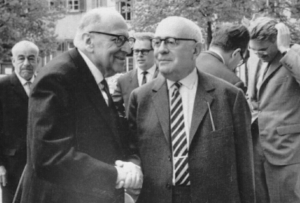Seyla Benhabib in the Boston Review:
 May 1968 marked the political awakening of my generation. I was a junior at the American College for Girls in Istanbul at the time, feeling the revolutionary winds as a young Jewish woman in a predominantly Muslim society and because of the anti-Americanism precipitated by the Vietnam War. Pictures of napalm attacks on Vietnamese children and adults circulated among us during lunch hours. And when the U.S. Navy’s Sixth Fleet scheduled a visit to Istanbul, and many boyfriends, relatives, and others were clubbed by the police, our sense of political disappointment with and opposition to U.S. policies increased.
May 1968 marked the political awakening of my generation. I was a junior at the American College for Girls in Istanbul at the time, feeling the revolutionary winds as a young Jewish woman in a predominantly Muslim society and because of the anti-Americanism precipitated by the Vietnam War. Pictures of napalm attacks on Vietnamese children and adults circulated among us during lunch hours. And when the U.S. Navy’s Sixth Fleet scheduled a visit to Istanbul, and many boyfriends, relatives, and others were clubbed by the police, our sense of political disappointment with and opposition to U.S. policies increased.
Living in Istanbul, we knew that the wider political world was on fire. Soviet tanks crushed the Prague reform movement under Alexander Dubček and the “socialism with a human face” experiment. Students built barricades in Paris and confronted the police. And the countercultural movement in the United States challenged the pieties of bourgeois decorum. The continuing Israeli-Palestinian conflict was personally devastating: I feared for the continuing existence of Israel after the 1967 war, while feeling moral outrage and pain at the oppression and occupation of Palestinian Arabs.
May 1968 saw our revolt against the oppressive conformism of the postwar Pax Americana. We hoped for liberation from the spirit of consumerism, the shackles of the patriarchy, bourgeois family, nationalism, militarism, and much else. No theoretical tradition captured the aspirations I shared with many contemporaries as well as the critical theory of the Frankfurt School. My intellectual journey from Istanbul to Frankfurt began with Herbert Marcuse’s One-Dimensional Man (1964), which I read that fateful spring.
More here.
